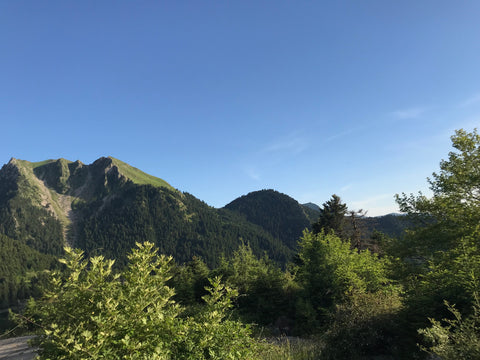Get advance notice before we put some unusual and rare honeys on sale
 Our lovely Greek beekeepers Thomas, Elena (sister) Giorgios (father), Panos (cousin) and Costas (Uncle) have been very busy this year.
Our lovely Greek beekeepers Thomas, Elena (sister) Giorgios (father), Panos (cousin) and Costas (Uncle) have been very busy this year.
I was speaking to Thomas yesterday and he had some very interesting news for honey lovers - especially if you love the thick Greek honeys. It turns out that it is quite a vintage year, for one particular honey in Greece, as you will see from this short video.update that Thomas has made for you.
The important thing to note is that this year the bees have been collecting the sap from near the base of the Fir tree, where it is richer in mineral salts. They only do this every 3 to 4 years. Normally they collect from higher up the tree, on the top branches, where the sap is richer in sugars. (I don't know why they do this but I am trying to find out.) This means the 2019 Fir could be a more savoury honey, one that is richer in minerals. Thomas sent it yesterday.
He also sent some of the Greek Thyme, which is highly regarded.
Would you like to get advance notice when these honeys arrive - before we email our whole customer list? (Also, about the rare honeys I mention below.)
Thomas said that he has news of two other honeys (both of which are very rare), which he is trying to secure for us. He has done a couple of videos about these two rare honeys - which I will share if he can secure them for us (from his cousin).
One is a honey that is highly esteemed and generally comes from the Middle East and north Africa, known there as Sidr. We have been seeking this honey for 10 years. Put your email in the box above if you want to get advance notice of these honeys as well.
Finally, I wanted to show you the place high in the mountains where the Fir comes from- in the locality of Argithea.
And below is a photo I took of the whole family at Argithea,last June when I visited. From left to right Elena (sister), Costas (Uncle), Panos (cousin), Thomas and Giorgias (father). If you have any questions drop me an email - tim@therawhoneyshop.com.



6 comments
Tim - Raw Honey Shop
Hi Barbara, apologies for taking so long to reply, I only just saw the comments on this post. I can confirm that there is no wing clipping of the queen, hives are open and that honey is left for the bees. Thomas is in the process of getting organic certification. Best wishes Tim
Tim
Philip, thanks for giving some details. The Fir honey comes from a coniferous tree. Any more thoughts? Tim
Philip Mitchell
Hi Tim, Trees modulate their production of sugars. Depending on the type of tree it could be due to producing flowers/fruit/seeds etc. Trees that do not blossom every year, modulate in this way. It may also be that the tree is supporting other trees in it’s network/forest but I think the former is more likely. Probably a deciduous tree.
Barbara
Hi,
Can you confirm that Thomas’ hives are sustainably managed with the highest level of bee welfare
eg open hives 24/7, honey left for bees not sugar water and the queens are intact? Thank you.
Suzanne Manning
Your honey’s are like a little taste of heaven to me, so thank you for all your efforts to make that possible.
erica guest
i am interested in this amazing story about this rare honey i cant wait to try it out